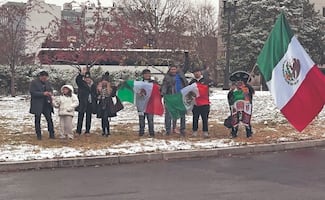Joaquín “El Chapo” Guzmán Loera's alleged deteriorating health does nothing to stop him from being extradited to the United States, according to Carlos Daza, a professor at the UNAM university in Mexico City.
In an interview with EL UNIVERSAL, the professor explained that the international extradition treaty under which El Chapo is being extradited mentions nothing about what his attorney is arguing.
“The health of a person is not enough to keep them from being extradited. I believe that what his defense attorney is trying to do is use this as a way to stop his extradition but by claiming that he's being tortured, but it doesn't affect the due process in the slighest,” he explained.
“One thing are the consequences this alleged torture has on the inmate and another thing is the extradition process, which are two totally separate things. The international treaty doesn't cover this matter,” he added.
Emma Coronel, Guzmán Loera's common-law wife, filed a complaint with the Mexican National Human Rights Commission in which she claims that the former cartel leader is being tortured and his life is in danger.
According to a medical exam performed in August, El Chapo “presents physical signs and symptoms that demonstrate that he is currently or has undergone abuse while in prison.”
In the report it also said that at the time he was suffering from “generalized anxiety disorder,” and well as from auditory hallucinations, disorientation, short-term memory loss and headaches.
Although Daza does say that if the allegations are proven to be true, El Chapo could seek damages in accordance with the Mexican General Victims' Act.
“A judge decides if the treaty's requirements are met for the process to proceed; a judge doesn't hand down a ruling on the allegations against that person, whether that person is guilty or not. The only thing the judge does is decide of the formalities in the treaty are met or not,” he added.
“The only thing that would happen if the Inter-American Court of Human Rights were to get involved is that authorities may or may not be held responsible for the allegations of torture, but it would do nothing to stop El Chapo's extradition to the U.S.,” he concluded.
Noticias según tus intereses
[Publicidad]
[Publicidad]














